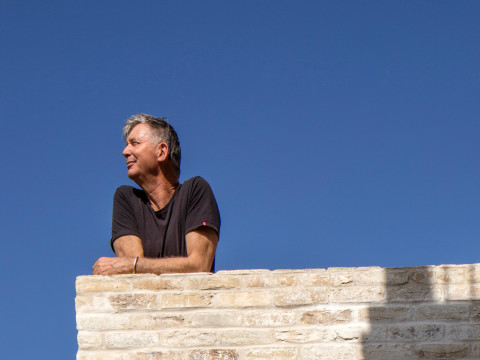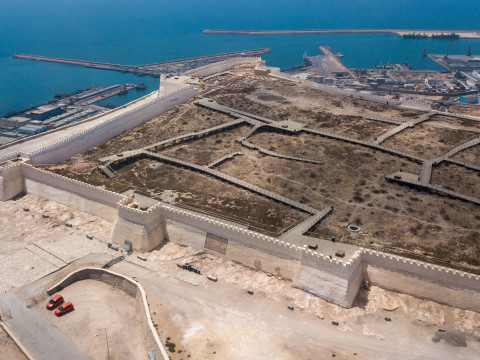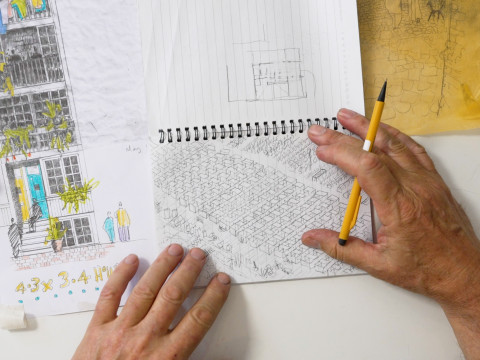
Five architects to know: meet the shortlist of the RA Dorfman Award
By Laura Mark
Published on 8 February 2018
From a collective encouraging communities in Bogotá to self-organise to build, to a woman architect mentoring the next generation in Ethiopia, the shortlist for the first RA Dorfman Award recognises global talent from around the world. Find out more about the architects hoping to pick up the prize.

Arquitectura Expandida
Arquitectura Expandida is a design collective based in Bogotá, Colombia that builds structures of public assembly for communities that cannot afford to go through official channels for design and construction.
Founded by Ana Lopez Ortego, Harold Guyaux, Randy Orjuela, Marina Tejedor, and Felipe González, the collective was formed in 2010.
The collective’s projects are processes of creative resistance, and have ranged from tiny community cinemas and cultural spaces to public spaces and sports facilities.
Its actions and interventions seek to encourage citizens to actively take part in the transformation process of their streets, parks and neighbourhoods, responding to a diverse range of conflicting relationships, institutions, bureaucracies, practices and scenarios.
In 2017, Arquitectura Expandida was shortlisted for the Curry Stone Design Prize, an award that honours socially impactful design professionals.

Go Hasegawa
Go Hasegawa founded his firm Go Hasegawa and Associates in 2005, just three years after graduating from the Tokyo Institute of Technology.
His debut project, entitled House in a Forest, involved a gabled attic space supported by struts beneath a gable roof aimed at creating a new spatial sensation. Since then he has gone on to design many houses that explore the merging of outdoor and indoor space.
In 2015, he received a PhD in Engineering from the Tokyo Institute of Technology. Hasegawa has exhibited at the TOTO Gallery MA in Tokyo, the 2012 Venice Biennale, the 2017 Chicago Biennale and the Canadian Centre for Architecture.
His recent works include Yoshino Cedar House in collaboration with Airbnb, which includes a community centre with traveller accommodation, and Chapel in Guastalla, made of shin marble that gives a new sense of materiality with its transparency.

Anne Holtrop
Anne Holtrop founded his practice Studio Anne Holtrop in the Netherlands in 2009 and he now also has an office in Murharraq, Bahrain. Holtrop previously trained as an engineer and subsequently worked as an assistant to the artist Krijn de Koning.
His work ranges from models to temporary spaces, exhibitions and buildings. He designed Bahrain’s pavilion at the World EXPO2015 in Milan.
His practice is now working on a number of projects in Bahrain, such as the Sheikh Isa Bin Ali Al-Khalifa Museum, the restoration of the Qaysariya Suq and the adaptation and conservation of historic buildings in Muharraq.

Rahel Shawl
Rahel Shawl is the founder and director of one of the leading architectural practices in Ethiopia, as well as a role model, advisor and mentor for emerging architects.
Born and educated in Ethiopia, she co-founded Abba Architects in 1992, founded Raas Architects in 2004 and co-founded Equinox Property Developers in 2012.
Under her leadership, she and her team of 16 at Raas Architects have worked on a wide range of projects including embassies, schools, health centres, offices, commercial, industrial and residential buildings.
Rahel received the Aga Khan Award for Architecture in 2007 for her work as architect of record on the Royal Netherlands Embassy in Addis Ababa.
Rahel was also the first architect from sub-Saharan Africa to be awarded the Loeb Fellowship at the Harvard Graduate School of Design in 2017. She was appointed as an Honorary Good Will Ambassador for Zer Ethiopia in 2014, an NGO promoting Young Ethiopian Girls in Education.

Alireza Taghaboni
Iranian architect and painter Alireza Taghaboni has been a practicing architect since 2004 and founded nextoffice in 2009.
Based in Tehran, nextoffice aims to provide contemporary responses to traditional Iranian architecture, taking into account climatic conditions, the economic, political and socio-cultural context of the country and peculiarities of each project’s site.
The practice’s projects range from detached single-family houses to urban master plans and residential, commercial and mixed-use large-scale complexes.
Its Sharifi-ha house, which features rotating rooms that adapt to Iran’s fluctuating lifestyles and offers a critical response to building regulations and zoning by-laws, was shortlisted at the World Architecture Festival in 2014.

Royal Academy Architecture Awards
The RA has launched two new international architecture awards that demonstrate and heighten the RA’s role as a global champion of architecture. Nominated and awarded by Royal Academicians alongside international curators and critics, the Royal Academy Architecture Prize honours an inspiring and enduring contribution to the culture of architecture, and the RA Dorfman Award champions new talent in architecture.
Itsuko Hasegawa, winner of the 2018 Royal Academy Architecture Prize.
Related articles

Crunch: inside the first Architecture Window display
14 February 2024

RA Architecture Prize Winner 2023: Shane de Blacam
1 September 2023

Introducing Bêka & Lemoine
9 August 2023

In the studio: Peter Barber RA
27 July 2023





















